While deeply rooted in Rice University's O-Week customs, the influence of the rice purity test stretches far beyond the confines of the university.
The Inception and Century-Long Evolution of the Rice Purity Test
Originating at Rice University in the early 20th century, the Rice Purity Test has undergone numerous modifications and iterations throughout its almost century-long existence.
As per the accounts of the Rice Thresher, Rice University's student newspaper, the inaugural version of the Rice Purity Test emerged in 1924 and was initially exclusive to women. Half a century later, in 1974, the test made a resurgence, showcasing its enduring popularity.
A pivotal transformation occurred in 1988 when the test evolved from its original 10-question format to an expanded set of 100 questions. Subsequent years, such as 1998 and 2008, witnessed alterations in the questionnaire, with the 2008 version being notably considered cruder than the current rendition.
From Local Campus Tradition to Global Phenomenon
While the test has traditionally served as a symbolic transition from Orientation Week to genuine college life at Rice University, its impact has transcended campus boundaries. Taking the Rice Purity Test isn't just a voluntary bonding activity for O-week groups; it's an opportunity for students to chronicle their life experiences and personal growth throughout their college journey. Beyond being a staple of Rice's O-Week, the Rice Purity Test has gained widespread popularity in colleges and even high schools worldwide.
The rise of online platforms has played a pivotal role in propelling its global presence. Online versions of the test have been created and widely shared on the internet, reaching individuals across the globe and offering them a playful and enjoyable way to assess their life experiences.
The turning point arrived in 2020 when the Rice Purity Test experienced an unprecedented surge in popularity on the social media platform TikTok. This digital stage provided the perfect arena for the test's global ascent, transforming it from a localized campus tradition into a worldwide sensation.





Comments